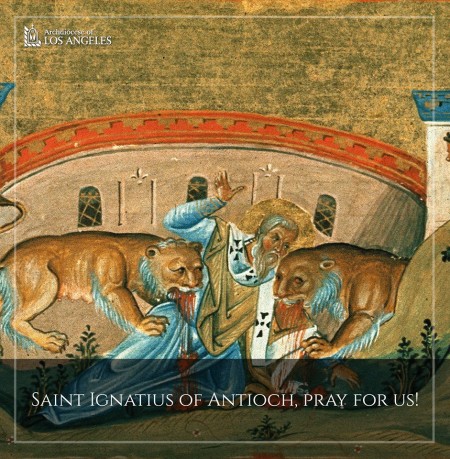 St. Ignatius of Antioch
St. Ignatius of Antioch
Image Courtesy: Archbishop Jose Gomez
(CNA) Born around the year 50 in Syria, Saint Ignatius is said to have been personally instructed together with another future Martyr for Christ Saint Polycarp (Feast Day: 23 February) by the Apostle St. John.
When Ignatius became the Bishop of Antioch around the year 70, he assumed leadership of a local Church that was according to tradition, first led by Saint Peter before his move to Rome.
Although Saint Peter transmitted his Papal primacy to the Bishop’s of Rome rather than Antioch, the city played an important role in the life of the early Church. — Located in present day Turkey, it was the chief city of the Roman Empire and was also the location where the Believers in Jesus’ teachings and the resurrection were first called ‘Christians.’
Ignatius led the Christians of Antioch during the reign of the Roman Emperor Domitian the first of the emperors to proclaim his divinity by adopting the title ‘Lord and God’ — Subjects who would not worship the emperor under his title were subject to the punishment of death. As the leader of a major Catholic diocese during this period, Ignatius showed courage and worked to inspire it in others.
After Domitian’s murder in the year 96 his successor Nerva reigned only briefly and was soon followed by Emperor Trajan and during his reign, Christians were once again liable to death for denying the pagan state religion and refusing to participate in its rites. It was during his reign that Ignatius was convicted for his Christian testimony and sent from Syria to Rome to be executed.
Escorted by a team of military guards, Ignatius nonetheless managed to compose seven letters, six to various local Churches throughout the empire (including the Church of Rome) and one to his fellow Bishop Saint Polycarp, who gave his own life for Christ several decades later.
Saint Ignatius’ letters passionately stressed the importance of Church unity, the dangers of heresy and the surpassing importance of the Eucharist as “the medicine of immorality.” These writing contain the first surviving description of the Church as ‘Catholic’ from the Greek word indicating both universality and fullness.
One of the most striking features of Ignatius’ letters is his enthusiastic embrace of martyrdom as a means to union with God and eternal life.
“All the pleasures of the world and all the kingdoms of this earth shall profit me nothing. — It is better for me to die in behalf of Jesus Christ, than to reign over all the ends of the earth,” Ignatius wrote to the Church of Rome.
“Now I begin to be a disciple,” Ignatius declared. “Let fire and the cross; Let crowds of wild beasts; Let tearing, breakings and dislocations of bones; Let shatterings of the whole body and let the dreadful torments of the Devil come upon me, only let me attain to Jesus Christ.”
Saint Ignatius bore witness to Jesus Christ publicly for the last time in Rome’s Flavian Amphitheater where he was mauled to death by lions.
“I am the wheat of the Lord,” Saint Ignatius declared before facing the lions. “I must be ground by the teeth of these beasts to be made the pure bread of Christ.”
In 2007 Pope Benedict XIV said of Saint Ignatius: “No Church Father has expressed the longing for union with Christ and for life in Him with the intensity of Ignatius.”
More here from Franciscan Media and here from EWTN
Tweet